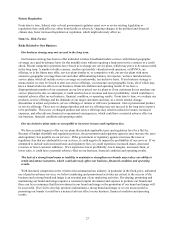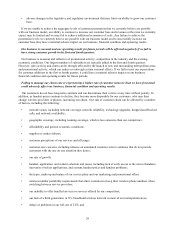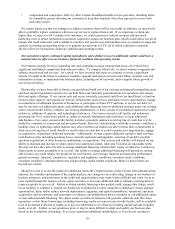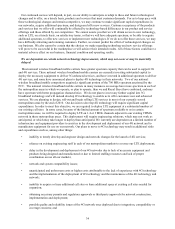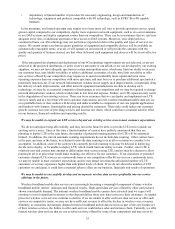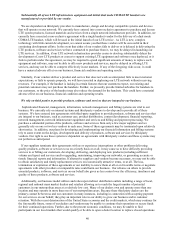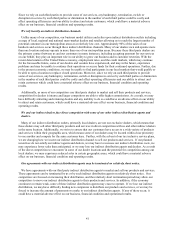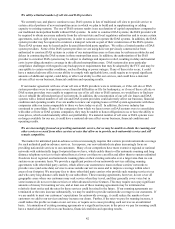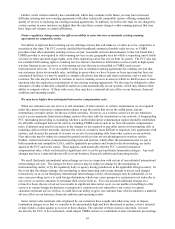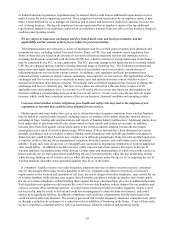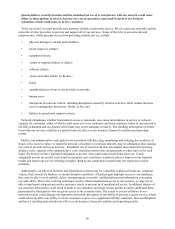Metro PCS 2009 Annual Report Download - page 49
Download and view the complete annual report
Please find page 49 of the 2009 Metro PCS annual report below. You can navigate through the pages in the report by either clicking on the pages listed below, or by using the keyword search tool below to find specific information within the annual report.37
• impact on our cash and available credit lines for use in financing future growth and working capital needs;
• obligations imposed on us by counterparties in such transactions that limit our ability to obtain additional
financing, our ability to compete in geographic areas or specific lines of business, or other aspects of our
operational flexibility;
• increasing cost and complexity of assuring the implementation and maintenance of adequate internal
control and disclosure controls and procedures, and of obtaining the reports and attestations required under
the Exchange Act;
• loss of or inability to attract and retain key personnel;
• impairment of relationships with employees, customers or vendors;
• difficulties in consolidating and preparing our financial statements due to poor accounting records, weak
financial controls and, in some cases, procedures at acquired entities not based on U.S. GAAP particularly
those entities in which we lack control;
• costs and complexity in complying with U.S. GAAP;
• inability to predict or anticipate market developments and capital commitments relating to the acquired
company, business or technology; and
• with respect to any spectrum acquisition in a foreign country, difficulties and expenditures associated with
operating in a foreign jurisdiction.
The anticipated benefit to us of any strategic transaction, acquisition or merger may never materialize. Future
investments, acquisitions or dispositions, or similar arrangements could result in dilutive issuances of our equity
securities, the incurrence of additional debt, contingent liabilities or amortization expenses, or write-offs of
goodwill, any of which could have an adverse effect on our business, financial condition and operating results. Any
such transactions may require us to obtain additional equity or debt financing, which may not be available on
acceptable terms, or at all.
Additionally, our expected growth and any acquisitions or business combinations will also require stringent
control of costs, diligent management of our network infrastructure and our growth, increased capital requirements,
increased costs associated with marketing activities, the attraction and retention of qualified management, technical
and sales personnel and the training and management of new personnel, and the design and implementation of
financial and management controls. Our growth will and any acquisitions or business combinations may challenge
the capacity and abilities of existing employees and future employees at all levels of our business and the controls
and systems we have implemented. Failure to successfully manage our growth and development or any acquisitions
or business combinations could increase our costs and adversely affect our level of service, which could have a
material adverse effect on our business, financial condition and operating results.
Business, political, regulatory and economic factors may significantly affect our operations, the manner in
which we conduct our business and slow our rate of growth.
The United States economy has deteriorated significantly, unemployment rates have increased and such
conditions may continue for the foreseeable future. Our business could be further affected by such economic
conditions, unemployment rates, as well as consumer spending, in the areas in which we operate. These factors are
outside of our control. If economic conditions and unemployment rates continue to deteriorate, or remain depressed,
our existing and future customer base may be disproportionately and adversely affected due to the generally lower
per capita income of our customer base (versus the national facility-based wireless broadband mobile carriers),
which may be disproportionately affected by any disruption in the United States economy, including an economic
downturn or recession. In addition, a number of our customers work in industries which may be disproportionately
affected by an economic slowdown or recession. More generally, adverse changes in the economy are likely to
negatively affect our customers’ ability to pay for existing services and to decrease their interest in purchasing new
services. These same economic conditions may negatively impact our third-party service providers who experience
cash flow problems, liquidity concerns or are unable to obtain or refinance credit such that they may no longer be


